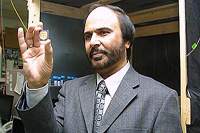Human brain cells linked to silicon chip
Neurochip connects brain tissue to microprocessor.

A neurochip, a microchip that can monitor and amplify the minute signals between human brain cells, has been developed by researchers at Calgary University, Canada.
Human brain cells are grown on the chip and form a bond with the electrical terminals. This allows the very fine-grained synapses to monitored more easily and with greater clarity than ever before.
Research is some way off from the bionic control of the Six Million Dollar Man but it is a small step closer.
By being able to monitor synapses, it could be possible to understand how they could be made to interact with a processor and produce a direct link between the human brain and, for example, a prosthetic limb with a greater degree of subtly than is available today.
This would require being able to attach the cells on the chip to the brain or grow the chip actually inside the brain cells.
Naweed Syed, professor and head of the Department of Cell Biology and Anatomy at the university, said:
"We have never been able to record the subtle activity from brain cells that we have now because this is actually the last frontier."
Sign up today and you will receive a free copy of our Future Focus 2025 report - the leading guidance on AI, cybersecurity and other IT challenges as per 700+ senior executives
"This technical breakthrough means we can track subtle changes in brain activity at the level of ion channels and synaptic potentials," he explained.
The neurochip will be tested to see how brain cells work under normal conditions and then be treated with a drug to see what effect it has. Syed hoped that this could lead to the discovery of effective treatments for a variety of neurodegenerative diseases, such as Alzheimer's and Parkinson's.
-
 The modern workplace: Standardizing collaboration for the enterprise IT leader
The modern workplace: Standardizing collaboration for the enterprise IT leaderHow Barco ClickShare Hub is redefining the meeting room
-
 Interim CISA chief uploaded sensitive documents to a public version of ChatGPT
Interim CISA chief uploaded sensitive documents to a public version of ChatGPTNews The incident at CISA raises yet more concerns about the rise of ‘shadow AI’ and data protection risks